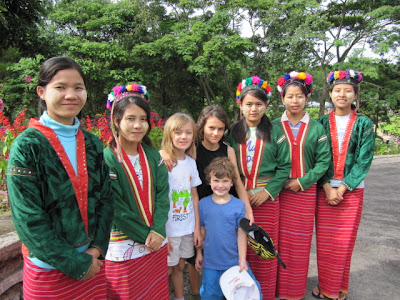 |
| The headdresses of the Palaung Hill Tribe |
 |
| The Kalaw market has an amazing array of produce, along with other hill tribe groups like this one, the Pa-O (Black Karren). |
 |
| Amazing eels, grilled on a stick, still squiggling with life before grilled |
June 14, 2011
We stayed overnite at Pine Hill View Hotel outside of Kalaw,
a short flight east of Mandalay, up in the mountains of the Shan state which
borders China on the east. We also took a gorgeous day hike up to see the Palaung hill tribe, their weavings, village, and amazingly fertile mountain-top farms.
Ah, the air was so much cooler with fresh breezes
and infrequent cool, light showers coming down. Turns out the British colonists
also liked it, turning it into a hill station for themselves too. While some
colonial buildings remain in the village of Kalaw, it’s most known for the
fabulous hiking into the surrounding mountains to see the tribal people in
their hilltop villages. These tribes are not impoverished. In fact, in the last
10 years they are now able to throw out their old bamboo shacks and build
concrete homes due to the money they make off the produce grown in the rich,
red soil of the Shan mountains. They are able to make decent money off of green
tea, Asian pears, oranges, corn, and more.
In fact, hidden
higher in the hills are poppies grown for heroin that is traded as part of the
golden triangle, and the Shan heroin trade was formerly dominated by a Shan
drug kingpin who also doubled as a rebel fighter with a strong army fighting
the military government. Over time, his army weakened and he surrendered, dying
a peaceful death under house arrest in a big mansion in Yangon…hmm…makes you
wonder who in the military government was bribed to secure such a great jail for the
rebel leader/drug dealer. There may still be some resistance to the military
government among the Shan since part of the Shan state is off-limits for
tourists due to “instability.”
But, back to the large hill tribe produce market that just
happened to be in Kalaw the day we were there -- How lucky were we!! The hill tribe women walk and
get rides early in the morning down from their hill stations, with straw baskets strapped to their
foreheads filled with produce for sale. It’s not just the Palaung who come down
but it’s also the Pa-O (see photo above of woman in black with plaid orange
scarf wrapped on her head selling produce at market) among others who come into
a market each day that rotates among 5 Shan towns, including Inle Lake. We ate the best traditional soup breakfast in the Kalaw market twice, since we loved it so -- Mohinga fish soup.
This was one of our favorite markets we’ve ever seen in
Southeast Asia. And, that says a lot. The Kuching, Borneo market in East
Malaysia may have been our favorite, up until now. This market in Kalaw had
such a rich set of produce, many we’ve never seen before like super long beans,
medicated eggs, medical roots you boil then drink, fish galore, fish paste, 200
kinds of rice, tiny little bitter eggplant the size of blueberries, and eels.
Note the photo above where the old, weathered, shut-down eelmonger was snapping
the necks of live eels pulled fresh from a burlap sack then placed wiggling as
they died on the counter for sale, right next to their barbequed brothers on a
stick.

No comments:
Post a Comment